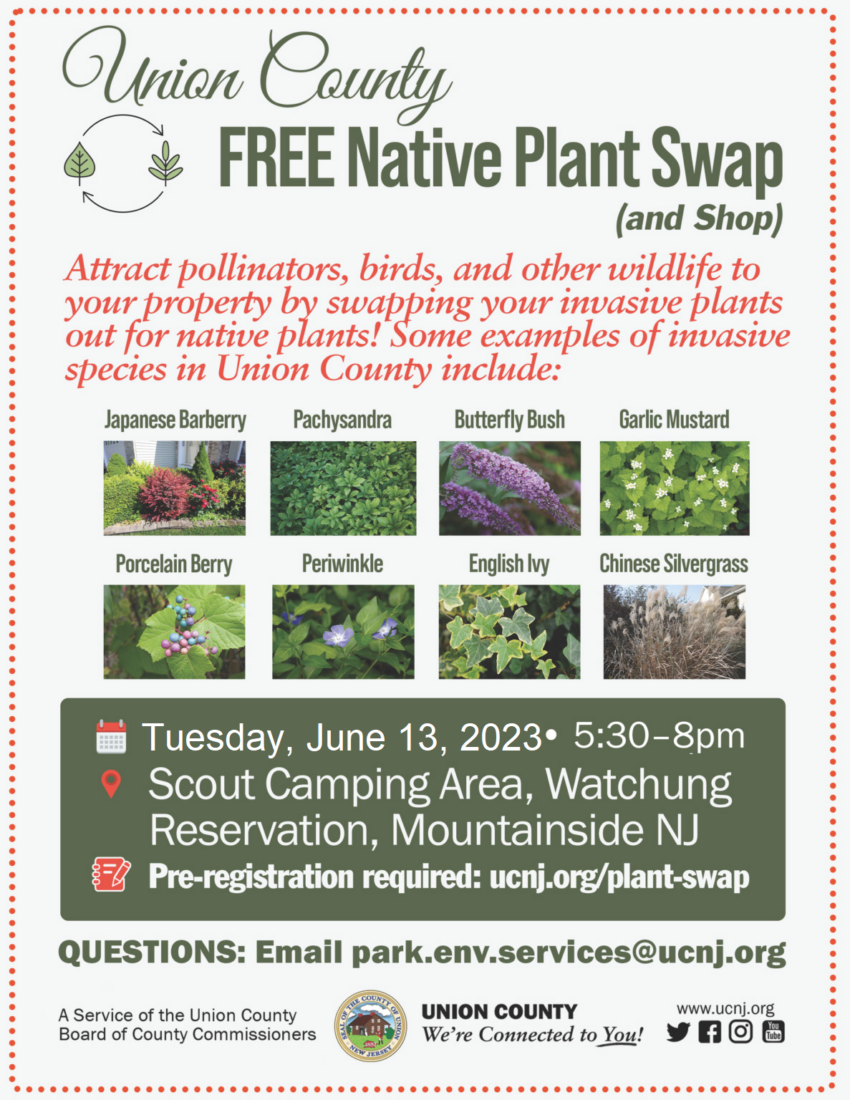This has been postponed to June 13th

The Union County Board of County Commissioners invites residents to come to the free “Native Plant Swap and Shop” event on Tuesday evening, June 13, 2023 from 5:30 p.m. to 8:00 p.m. and swap up to three invasive plants for a matching number of colorful, beneficial native plants, free of charge. Additional native plants will also be available for sale at the event. The event takes place in the Watchung Reservation at the Scout Camping Area, located near the Trailside Nature and Science Center at 452 New Providence Road in Mountainside.
“The Swap and Shop event is a fun way to learn about the value of native plants in our local ecosystem. Everyone with a yard or garden can help preserve and protect butterflies and other valuable pollinators, by taking out invasive species and replacing them with native plants,” said Union County Commissioner Chairman Sergio Granados.
Residents who plan to participate in the swap must pre-register online below. The swap is limited to 100 registrants. All other attendees are welcome on a walk-in basis. There is no charge for admission. Attendees can arrive any time after 5:30 and stay as long as they like.
Expert naturalists will be on site to provide guidance and information on gardening with native plants.
Examples of invasive plants to bring for the swap are: Japanese barberry, pachysandra, butterfly bush, garlic mustard, porcelain berry, periwinkle, English ivy and Chinese silvergrass. For accurate identification the invasive plants should be dug up recently and brought to the event in a sealed bag or box, with their entire roots included.
The native plants offered for swap include Cardinal Flower, Dense Blazing Star, Blue False Indigo, Joe Pye Weed, Foxglove Beardtongue, Swamp Milkweed and Orange Coneflower.
The Toadshade Wildflower Farm will also be on site with native plants for sale during the event. Participants who plan to make a purchase are advised to pre-order for pickup through the Toadshade website, toadshade.com.
For more guidance on gardening with native plants in Union County, including deer-resistant species, download the free “Plant This, Not That” guide.
Registration Form
What is an invasive plant?
Any plant that is not native (or does not naturally live in our area) that causes harm to the environment. In most cases, invasive plants are able to overtake an ecosystem and use up valuable space and resources from native plant species.
They do this by being very effective and fast reproducers and by being habitat generalists – they live well in a variety of conditions. Invasive plants have few, if any, natural predators or competitors (ie: deer, groundhogs, etc), so there is nothing to keep their population in check.
Once established, these plants can continue to grow and spread, and can eventually form a monoculture – an area with just one plant species – which is devastating to biodiversity.
How many can I bring?
As many as you would like! But we can only give you a maximum of 3 native plants per household.
How do I bring them?
Dig up the plant, roots and all, and place in a box, bag, etc. Be sure to tie or tape the container so nothing “escapes”!
Where do I bring them?
Use GPS directions for 452 New Providence Rd, Mountainside, NJ. Before entering the Trailside Nature & Science Center parking lot, take the Dead End service road to the left of the yellow and green Trailside sign. Follow that road downhill to the Scout Camping Area. There will be signs to help guide you.
How do I register and what plants will I be given in return?Please use the form above on this page. Any additional questions should be directed to park.env.services@ucnj.org. Plants that will be available for swapping (while supplies last) include:
- Cardinal flower
- Blue wood aster
- Narrow leaf sunflower
- Tall coreopsis
- Tall white beardtongue
- Swamp milkweed
How do I pre-order plants from Toadshade Wildflower Farm for this event?
Simply go to toadshade.com, and during checkout enter “Union County Swap and Shop” in the special requests box. For the shipping option, choose “pickup.”
Is this a COVID-Safe Event?
YES! Place your invasive plants in your vehicle’s trunk or back seat so that our event staff can easily remove them and load your new native plants. Attendees are also welcome
What are examples of invasive plants?

Questions?
Any questions can be directed to park.env.services@ucnj.org
